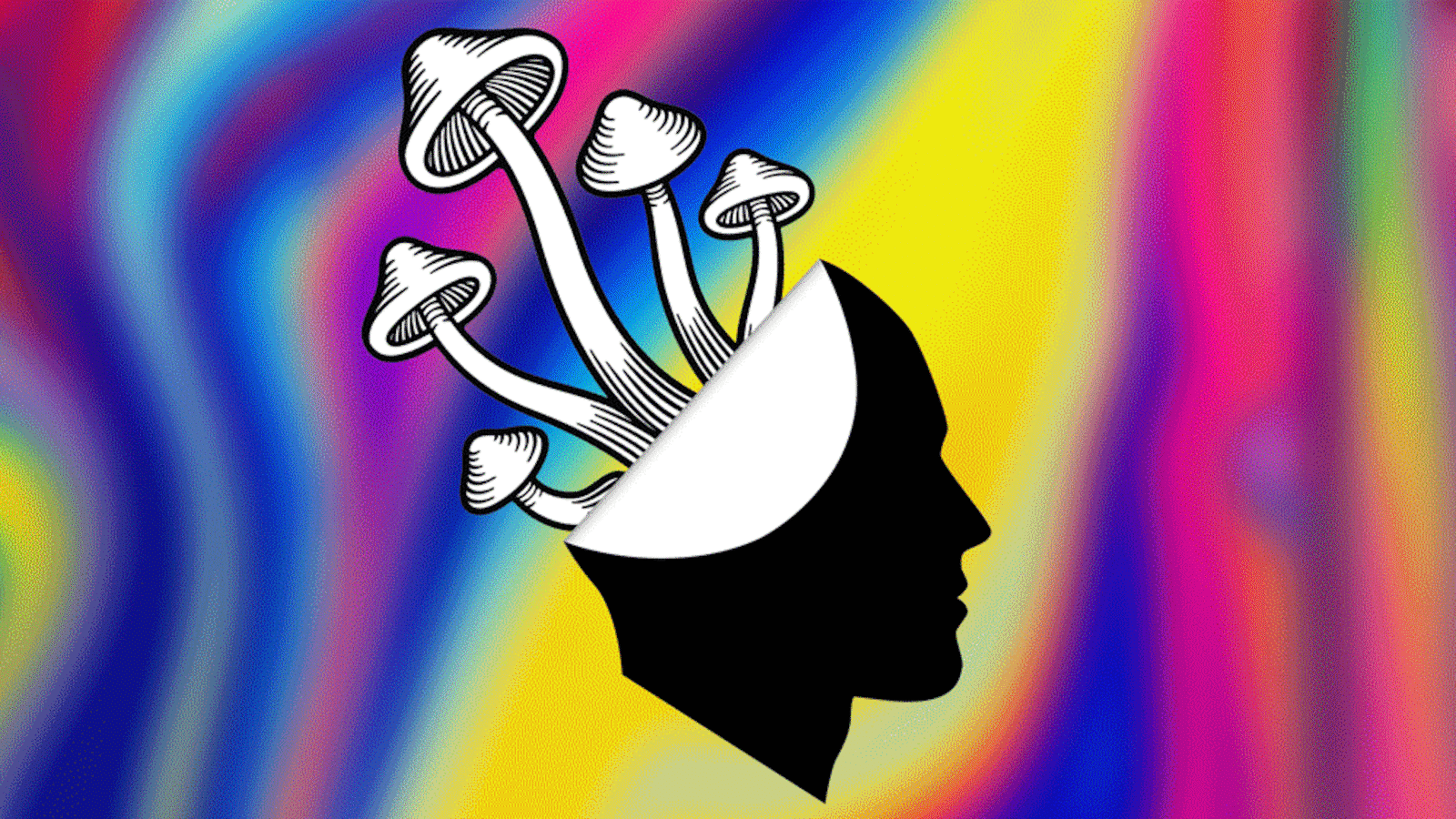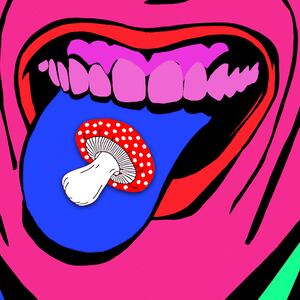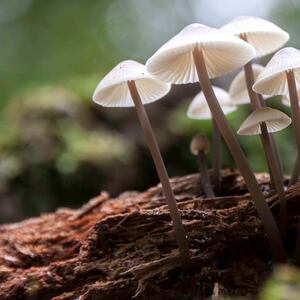Content warning: This story addresses suicide attempts. If you or a loved one is struggling, call the National Suicide Prevention Lifeline at 1-800-273-TALK (8255).
Tabitha Quattlebaum was sick of being sad. The 31-year-old artist and mom had tried everything—therapy, yoga, medication—to stop her suicidal thoughts, but nothing helped. Then, two years ago, she tried to kill herself for the last time.
Fed up, she found a doctor in Portland, Oregon, who grows psychedelic mushrooms and treats patients with them in underground sessions. She started microdosing—taking one-tenth of a gram, in capsule-form—every two days, followed by a larger “heroic dose” for an intense, reflective trip.
Within a week, she noticed herself changing. In two weeks, her depression had all but vanished. “It was like this cloud rolled away and I could see my own bullshit clearly,” she said, adding she’s no longer suicidal. “I truly have been transformed. I feel like I’m living proof that this works.”
On Nov. 3, Oregon could become the first state ever to legalize magic mushrooms as a mental health treatment. The legislation, Measure 109, would allow trained “facilitators” to give patients psilocybin—the hallucinogenic compound in mushrooms—and guide them in “breakthrough therapy” at licensed centers.
While early research shows the drug can help with anxiety, depression, and post-traumatic stress, opponents say it hasn’t been studied enough to be approved safely. They warn that mushrooms—which are considered a “schedule-1” drug, on par with heroin and ecstasy —can be triggering for people with some disorders, such as latent schizophrenia.
But that hasn’t stopped Oregonians from shrooming with shrinks in under-the-radar sessions that range from clinical to indigenous-inspired and ceremonial. The Daily Beast spoke to half a dozen people—including a retired Navy SEAL, a rape survivor, and a former cocaine addict—about their sessions. Most reported life-changing positive results. Others said their cosmic journeys led them to messy, unexpected places.
Their stories offer a glimpse into Oregon’s underground mushroom therapy, which could soon sprout into the light.
The Soldier
Chad Kuske felt like he might snap. The handsome 39-year-old former Navy SEAL had spent years fighting in Iraq and Afghanistan, where he got hooked on the rush of war.
“You could say adrenaline and stress were my drugs of choice,” he said. “When you have to maintain a top performance level for that long, it causes physiological changes in you. Couple that with the fact that people are trying to kill you, and it takes a psychological and mental toll, too.”
So when he retired and moved back to Portland two years ago, he felt isolated and restless. Civilian life seemed dull and meaningless. There were no high-stakes missions, no kill-or-be-killed scenarios. “I was burnt out and angry all the time. I was unable to connect with people. I had a lack of patience and compassion,” he said.
Those feelings manifested as an “atypical form of PTSD”—one that wasn’t triggered by a single trauma, he said. “[Being a SEAL] is like being a boxer: It’s not one massive knockout, it’s getting hit thousands of times over 20 years that gets you.”
To cope, he turned to drugs and booze. Intoxication helped him stuff down his anger, but he could feel people walking on eggshells around him. He feared that, one day, he’d blow up.
Then, last year, a friend from his unit told him about an underground psilocybin therapy group for military veterans. After devouring books and studies about the drug, he signed up in the summer of 2019.
In March, he met with a therapist twice to talk about his feelings and “set intentions” for a psychedelic trip. On the third meeting, he ate a large dose of mushrooms and laid on a mat, near other vets, listening to music with headphones.
As a dreamlike state washed over him, he was struck by an image of himself as a child. “I realized I was just a scared little boy, and that I felt helpless. I saw that, over the years, I’d been trying to defend my ego by telling myself certain stories and underplaying that I’m scared,” he said.
After that moment and other poignant ones, he felt like he dropped a bag of rocks he’d been lugging around for decades. “I felt hundreds of pounds lighter,” he said. “It created space for me to make changes.”

He saw the same therapist several more times to “integrate” his emotional awakening into real life. Soon, he was able to feel compassion for others—and for himself. “I let go of the anger because it wasn’t serving me,” he said.
Kuske suspects therapists from the Oregon Psychiatric Physicians Association (OPPA)—the most vocal group opposed to the mushroom therapy bill—fear that some jobs in the field will become obsolete if the bill passes.
“I can understand why they’d be opposed to something that is the equivalent in one session to a lifetime of therapy, or pharmaceutical drugs,” he said. (OPPA didn’t return a request for comment.)
Kuske now believes psilocybin helped his brain create new pathways of thought and leave behind old, unhealthy ones. “It’s like you’re standing on your back porch, looking out at a bunch of different paths leading into the forest,” he said, referencing an analogy from Michael Pollan’s book on psychedelics, How to Change Your Mind. “This medicine is like a fresh coat of snow that falls and covers everything—and you can pick a new path.”
The Survivor
Tina’s* breakthrough started with a bad trip. Sprawled out on the floor of her therapist’s living room, she saw frightening dark figures surrounding her on all sides.
“I was rocking back and forth and saying, ‘Fuck you!’ to myself,” the 63-year-old former firefighter said of the session two years ago. “I was thinking, this is not working.”
Earlier that morning, Tina—a recovering opioid addict and rape survivor, who suffered from anxiety—had swallowed 3.5 grams of mushrooms. Her therapist, who specialized in body-focused psychology, was DJ-ing her trip and chiming in with occasional questions.
“What’s going on in your mind?” she asked.
A thought crystalized: “That ‘I’m just bad,” Tina said.
Something inside of her clicked, and she sat up. She closed her eyes and was swept away by a stunning vision.
“I came up through the ground with a mushroom and saw all the different stages of my life. I was birthed into the soil and out into a dreamlike [structure] that I can only describe as a shimmering Taj Mahal. It was beautiful iridescent pink and turquoise, and I was completely saturated with love,” she said. “I saw all the different people who got me to the place where I was that day, and how I had been supported by the universe up until that moment.”
After the trip, it became clear she’d been using weed and pills to escape her painful past, along with an emotionally abusive marriage and a toxic work environment. The next day, she gave up drugs, cold turkey.
“I felt changes instantly. It was like an exorcism,” she said. “I’d done a straight decade of therapy—but this was life-changing.”
She soon divorced her husband and left her job at the fire department. “It made me take a look at who I was surrounding myself with, and start making better choices,” she said. “Now, I think twice before even taking a Tylenol.”
If the mushroom bill passes, she plans to become a licensed trip “sitter.” Scores of emotionally stunted people, like her former self, stand to be healed by combining the mind-expanding drug with a professional guide, she said.
“With the right person, you can open the door to real change,” she said. “For me, it was an awakening.”
The East-Coaster
Vinny* and Amber’s therapist gave them a fair warning. The long-term couple was struggling with communication and power dynamics, and they wanted to try taking psychedelics together. The goal was to be more present with one another, to connect and find some common ground.
Their shrink agreed to facilitate the trip—but warned that psychedelics can bring up long-simmering emotional baggage that sometimes isn’t pleasant. “She told us there is a chance that, when this is all over, your relationship will be over,” Vinny said. “And that’s actually what happened.”
In some ways, Vinny and Amber are polar opposites. He’s from the East Coast, she’s from the West. He’s straight-talking, she likes meandering conversation. He’s good at business, she’s good at art. Aside from their young daughter, they don’t have much in common.
To connect and better understand each other, they planned to start by taking MDMA, also known as Molly, in sessions separately. They’d then take it together with the therapist, and later microdose mushrooms.
For Vinny, the drugs led to powerful moments of self-discovery. “I realized I was intentionally desensitizing myself because of past trauma,” he said. “It helped me feel the emotions of empathy and love.”
The mini-doses of psilocybin also helped him connect with his daughter, he said. “I would work a long day and still be laser-focused and present with her. I found myself truly engaging,” he said.
But the experience put a magnifying glass on some of the couple’s problems—and ultimately played a role in their bitter break-up, he said.
“I could see her resenting me for changing. She was upset that I got to go through it, and she felt stuck in her life, like she couldn’t,” he said. “She was on board with me trying to heal myself—and now she says I’m a fucking terrible person for doing it.”
While they’ve since split, Vinny says the unconventional therapy, “was one of the top five experiences of my life.” Psychedelics might bring up difficult or messy feelings—but maybe that’s the point, he said. “If it’s scary and you dance with the devil then maybe that’s what you needed to see.”
The Addict
When Gary Sanders looked down at a Christmas photo of his family, it swirled into an ominous red liquid. The then-35-year-old Portland salesman, who was desperately addicted to cocaine, was tripping on mushrooms in a hotel room. And he took it as a sign.
“The photo was set as the screen-saver on my phone. Every every time I picked it up, it just, like, melted,” he said. “I realized I didn’t like where I was with my ex [wife]. And I had this deep clarity that I was creating my own misery.”
“It was like the heavens opened up, and—boom—I knew I had to stop doing drugs,” he said.
Sanders, who grew up as a Jehovah’s Witness, was emotionally and physically abused as a kid, he said. To feel “relief from the suffering,” he started secretly drinking at age 12. He tried cocaine for the first time as a 15-year-old.
“From there, it was whatever I could get my hands on.” He’d black out and go on booze-fueled benders for days. By the time he was in his thirties, he was married with kids, and completely hooked. “I was getting bloody noses, sweaty hands, just thinking about [cocaine]” he said.
Sanders tried Alcoholics Anonymous but, as an atheist, didn’t like all the God stuff, and he’d end up going back to the blow. But during the hotel room trip, he realized he’d been using coke to numb himself from unaddressed childhood pain.
“I came out of it with the clearest insight that coke and alcohol weren’t my core problem,” he said. “I had a huge awakening, and this incredible clarity.”
Sanders soon joined a recovery program, and began teaching meditation. He’s now been clean and sober for 13 years, and sees few downsides to legalizing mushrooms as a mental health treatment.
“It’s unrealistic to think it’s 100 percent safe, but it is a beautiful plant medicine—and it’s worth the relatively minor risk that someone will have a bad reaction,” he said.
Shrooms grow naturally in the Pacific Northwest, and it’s not hard to find someone who sells them, he said. “People are going to take them no matter what,” he said. “Why not let them do it with someone who is trained to support them?”

A DC resident has an operation growing psilocybin mushrooms, including these Galindoi variation of Psilocybe mexicana mushrooms, two middle, and Psilocybe cubensis mushrooms, left and right, in Washington, DC, on Monday, February 5, 2020. Activists in Colorado, Oregon and California have also pushed for approval of psilocybin mushrooms.
Jahi Chikwendiu/The Washington Post via GettyThe Mom
The first time Quattlebaum tried to kill herself, she was 16 years old. After she awoke in a hospital, a doctor prescribed her antidepressants. But her parents, who were strict Pentecostals, refused to let her take the medication.
“It was against their religion. They believe the only thing that should help you is the word of God and Jesus,” she said. “I was always out of step with their religion, and it manifested in dark ways—in fear and shame and guilt,” she said.
Over the next decade, she became obsessed with plotting elaborate ways to kill herself. “My thoughts of suicide felt almost poetic to me,” she said. “They were my best friend. I felt comforted by these scenarios in an almost creative way.”
To shake off the hopeless gloom of depression, she tried “all the traditional” paths, including years of therapy, prescription pills, diets, and hot yoga. She wanted to be strong for her young son, but none of it seemed to work. Her negative self-talk was sometimes crippling.
You’re a wretch, she told herself. Of course you didn’t graduate college, of course your son’s father cheated on you, who would want you in that body? You’re worthless.
Two years ago, when her son was 5 years old, she tried to end her life again. After she survived, a co-worker recommended psilocybin therapy.
“I was ready to try something different—anything,” she said. “I found a doctor from Portland who grows them.”
She and the doctor developed a plan for her to microdose every two days for a month. Within a week, she started noticing changes in herself. The first was a small one: Without hesitation, she threw out a pair of size-too-small pants that had been making her feel bad about her weight for years. “It stunned me because I used to love beating up on myself,” she said. “For some reason, in that moment, I was just able to let them go.”
Two weeks after the microdosing began, she took a two-gram “heroic dose” and felt a profound shift, she said. “I saw God not as someone who wants to send me to hell but as someone who wants me to love more,” she said. “I realized how apt I was to beat up on myself,” she said.
The psilocybin, she believes, functioned like a refresh button on her brain. “I no longer get stuck on these dark cyclical thoughts,” she said. “This obsession I had with wanting to die is gone.”
Ultimately, she wants Oregon to legalize psilocybin therapy to give folks like her—who have tried everything else, to no avail—an unconventional potential cure. “It works in ways other therapies can’t,” she said. “This medicine is truly eye-opening.”







